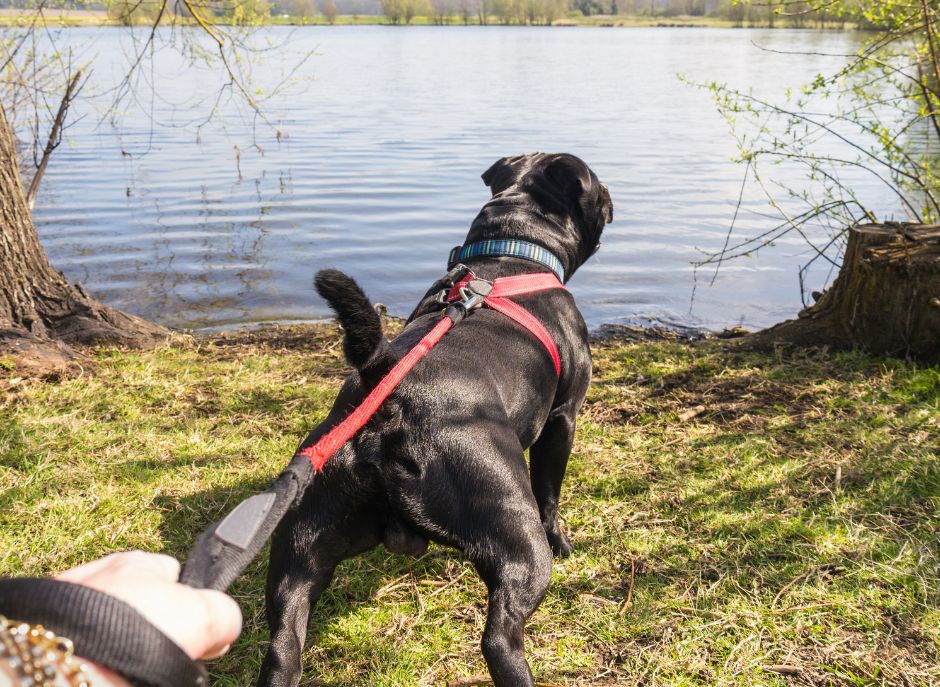How do you choose the right harness for your dog – or even know if a harness is the right choice? Our dog training expert at Clever Critter Pet Shop and Bakery weighs in to help you decide.
Harnesses are a tool that many people assume they need if their dog is strong or pulls – but does your friend really need one? And if so, what kind should you get?
Does your dog need a harness?
The answer is, it depends. If a dog is untrained and pulls on his or her leash, straining, choking or gasping can put pressure on their neck and trachea and cause damage. Ouch!
In these cases, a harness can be helpful, more evenly distributing the force on their bodies, and giving the human pal more control. It’s not ideal, however, because it also stimulates a pulling response in your dog – think of sled dogs – encouraging them to pull harder, or even resist.
Whenever possible we recommend you prioritize training your furry friend to walk comfortably with a standard leash and collar, or better – reliable off leash. They’ll be more comfortable, and so will you (and your arm, shoulder, back, etc).
Training treats can provide many dogs with a strong incentive to stay by your side; accompanied with voice commands (“with me” or “heel”), and practiced during every walk and soon your furry friend will associate leash walking with staying by your side.
If you do have an enthusiastic pup that needs help with leash manners, it’s important for both your sakes to train them both to walk on the lead. You’ll also want to familiarize and/or acclimate your pal to whatever they may encounter out in the big world: other people or animals, cars and trucks, birds and squirrels, bicycles, etc.
- Are you near Holderness, NH? Our sister enterprise, White Mountain College For Pets has you covered wiith top-rated dog training classes, including Lodge & Train programs for maximum manners training.
- If you’re further afield, find a local trainer near you who can help you build the skills to have your best pal walk by your side with easy confidence.
How to choose the right harness for your dog
Okay, let’s say you still want a harness, how do you choose the right type of harness for your needs? Here are the most common harness types, along with pros/cons to help you determine which one suits your situation.
Back-Clip Harness
The most common harness available. The harness slips over the head and buckles around the chest. The ring for the leash will be located at the base of the back of the neck.
- Pros: Easy to personalize with a lot of variety in colors and patterns, easy to put on, comfortable for most dogs.
- Cons: Does not prevent pulling.
Here’s an example of this style of harness – Rocky Mountain All Terrain Harness – it’s the only style we carry at The Clever Critter Pet Shop & Bakery.


Front-Clip or No-Pull Harness
Similar in style to the back-clip but as the name suggests, the ring for the leash is located at the chest of your pup. This can be a useful training tool since pulling will cause him to turn towards you instead of straining forward.
- Pros: Helps reduce pulling, provides better control.
- Cons: Excessive pulling may cause the harness to shift, leash can get tangled under the feet if there is too much slack.
Dual-Clip Harness
Works just like a front or back-clip except it has both options! Requires a special y-shaped lead that branches out from your handle to attach at both the front and the back.
- Pros: Provides maximum control, versatile; can transition between back-clip or front-clip harness.
- Cons: Typically more expensive, works best with the dual-clip leash, can be bulkier.
Step-In Harness
Among the easiest to put on. Control is similar to the back-clip harness; may not be best until leash etiquette is mastered.
- Pros: Easiest to put on and take off, comfortable for the dog.
- Cons: May not provide as much control for dogs that pull.
Vest Harnesses
Have a wide cloth-like structure that distributes pressure more evenly across the body. Most are a traditional back-clip style for walking.
- Pros: Distributes pressure, often includes padding for comfort, good for small or slim dogs, good for dogs sensitive to chafing from a traditional harness.
- Cons: Can be warmer, which might be an issue in hot weather, may need to be cleaned more often.
Specialty Harnesses
Come in all different types geared to the activities of your furry friend and the adventures you share:
- Seatbelt Harness – Keeps your friend safe in the car.
- Sport Harness – Specifically designed to distribute weight for dogs in pulling sports like sled racing, skijoring or bikejoring.
- Tactical Harness – Designed for military and law enforcement K-9s.
- Mobility Harness – Designed to help humans assist dogs with mobility issues.
If you’d like more information about harnesses and live near North Woodstock NH, stop by The Clever Critter Pet Shop and Bakery! We’re happy to help discuss your situation, shop for leashes and collars, or choose the right harness for your dog if that’s the best option for you!
